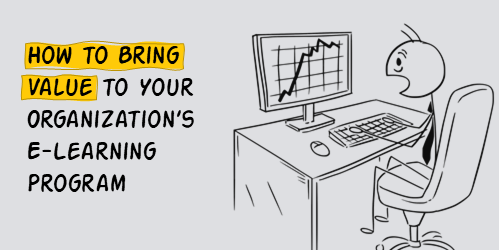
As a steward of an organization’s e-learning resources, it’s essential to make decisions that improve the bottom line. Aligning e-learning courses to the organization’s performance goals is key to ensuring positive results.
However, there are a number of other factors to consider when building out courses, such as cost and time savings. E-learning courses can reduce the cost incurred for facilitated classroom training, as well as increase accessibility for those who can’t attend scheduled training. Additionally, a great e-learning program can provide a return-on-investment to justify its presence within the organization.
By taking into account all of these factors, e-learning can add immense value to an organization. Here are three ways that you can state the value to your organization:
- Cost: Focus on not just the cost of projects and development time, but also the value you bring in comparison to outsourcing. What would training programs cost if you weren’t doing them? Consider the long-term savings that often accompany in-house training.
- Time: How quickly can you deliver the training? Time is money and delivering the training in a timely manner is critical. Consider how much time people spend in your course in comparison to the time commitment to learn a different way. Can you provide the same or better results in a shorter amount of time?
- Performance: Increased performance has a direct impact on the bottom line. Link your course objectives to performance objectives to demonstrate the impact of the training. If assessment and performance metrics are difficult to quantify, look for alternative ways to demonstrate the effectiveness of the training, such as customer satisfaction or employee retention.
Courses should focus on specific performance improvements for best results; when this isn’t possible, cost and time improvements can be shown to demonstrate value.
Free E-Learning Resources
![]()



















